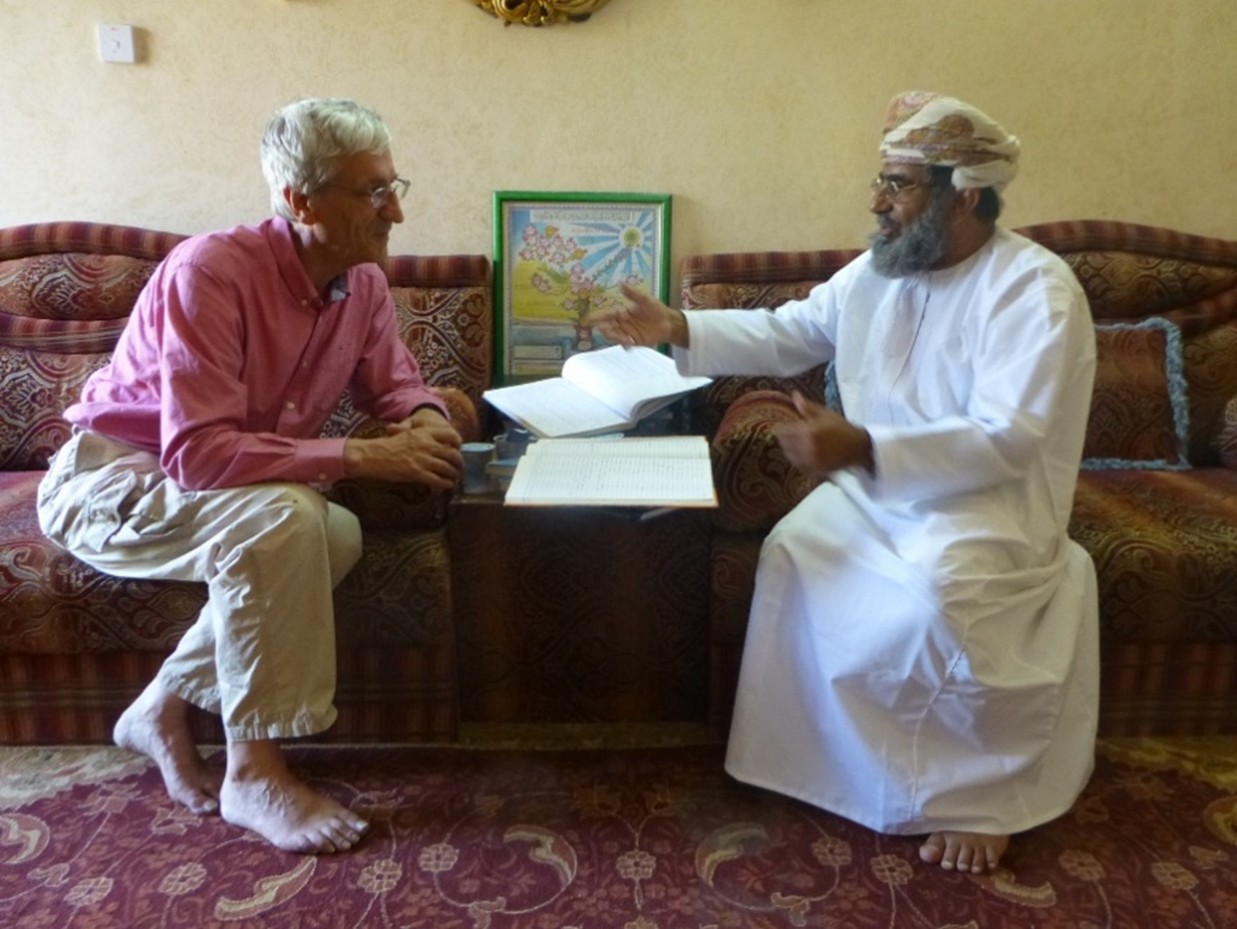
‘Listen carefully, co-create gently and develop ‘action-research’ to improve livelihoods locally’.
Roderic and the Wakil of Luzugh discussing future uses for the Omani falaj in 2013.
A dedicated geographer who promoted “Action Research” in Oman and the Middle East.
Early Years and Education
Roderic was born in 1942 and brought up on his family’s farm near Colchester. He boarded at the Society of Friends School Saffron Walden, where he became Head Boy. He then spent a year with Voluntary Service Overseas, teaching sciences in The Gambia, where he joined their international team for a match against Sierra Leone, as the ‘night watchman’ batsman. Roderic proudly kept his ‘cap’ and engraved trophy, all his life.
He went to Christ’s College, Cambridge, reading Natural Sciences, followed by an MSc at SOAS in Economic Geography and research for a PhD on colonial and post-colonial wheat farming in the Lower Madjerda valley in Tunisia. He married Esther Haynes on the 19th February 1971. They had two sons; Jake (who predeceased him) and Joss.
Durham University and the Centre for Overseas Research and Development (CORD) (1981-2002)
Northern Oman Surveys (1972-1976) and Khabura Development Project (1975-1994)
Roderic joined the Geography Department of Durham University in 1972 as a member of a multi-disciplinary team that conducted surveys, between 1972 and 1976, in northern Oman, from the coast at Al Khabura and across the Western Hajar mountains to Ibri in the interior. The surveys covered agriculture, fisheries, water resources (including wells and aflaj), soils and land capability, demography, social structures (the people) and marketing. This initiative stemmed from the Department’s long-standing research interests in the Middle East, resulting in funding of the surveys by Shell International Petroleum Company and Petroleum Development Oman. Roderic’s long-term connection with the Sultanate arose from these surveys.
Having led the agricultural surveys, Roderic saw the need for practical, follow-on activities that responded to the needs of rural people - and the Khabura Development Project was born, in 1975, with Roderic as Field Director. The focus was a 2.5-hectare farm, to have wide-ranging benefits for the selected community, working with goats and sheep which were basic to the local economy and way of life. The intensive small-farm system was a test-bed for linking research and development, the research guiding the development, and the development experience confirming or modifying the research findings.
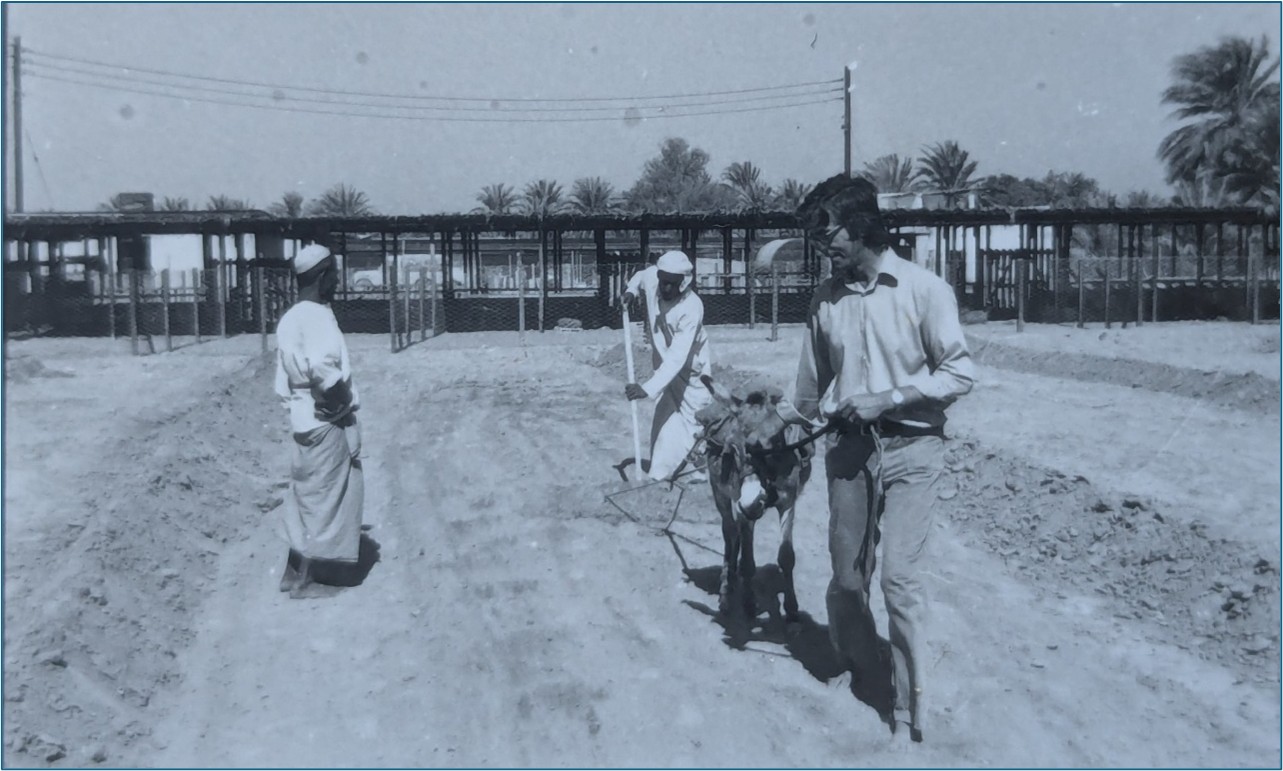 Roderic and Omani team in the early days of the establishment of the project farm at Al Khaburah (February 1978)
Roderic and Omani team in the early days of the establishment of the project farm at Al Khaburah (February 1978)
The farm grew irrigated fodder crops and cross-bred local goats and sheep with Anglo-Nubian and Chios sheep, respectively. The project employed specialists, in livestock husbandry, dairying, irrigation, farm machinery and extension. Specialists in health care, spinning/weaving (financed by the Ministry of Social Affairs and Labour) and beekeeping (financed by the Ministry of Agriculture and Fisheries) added to the mix. In its early years (1976-1980) this unlikely community, thrown together on the hot and humid Batinah Coast, had its challenging moments for all team members, including Roderic and his loyal wife, Esther, living on a farm with two very active pre-school boys. They returned to their Durham home in 1979, but the project continued under Roderic’s guidance until 1994.
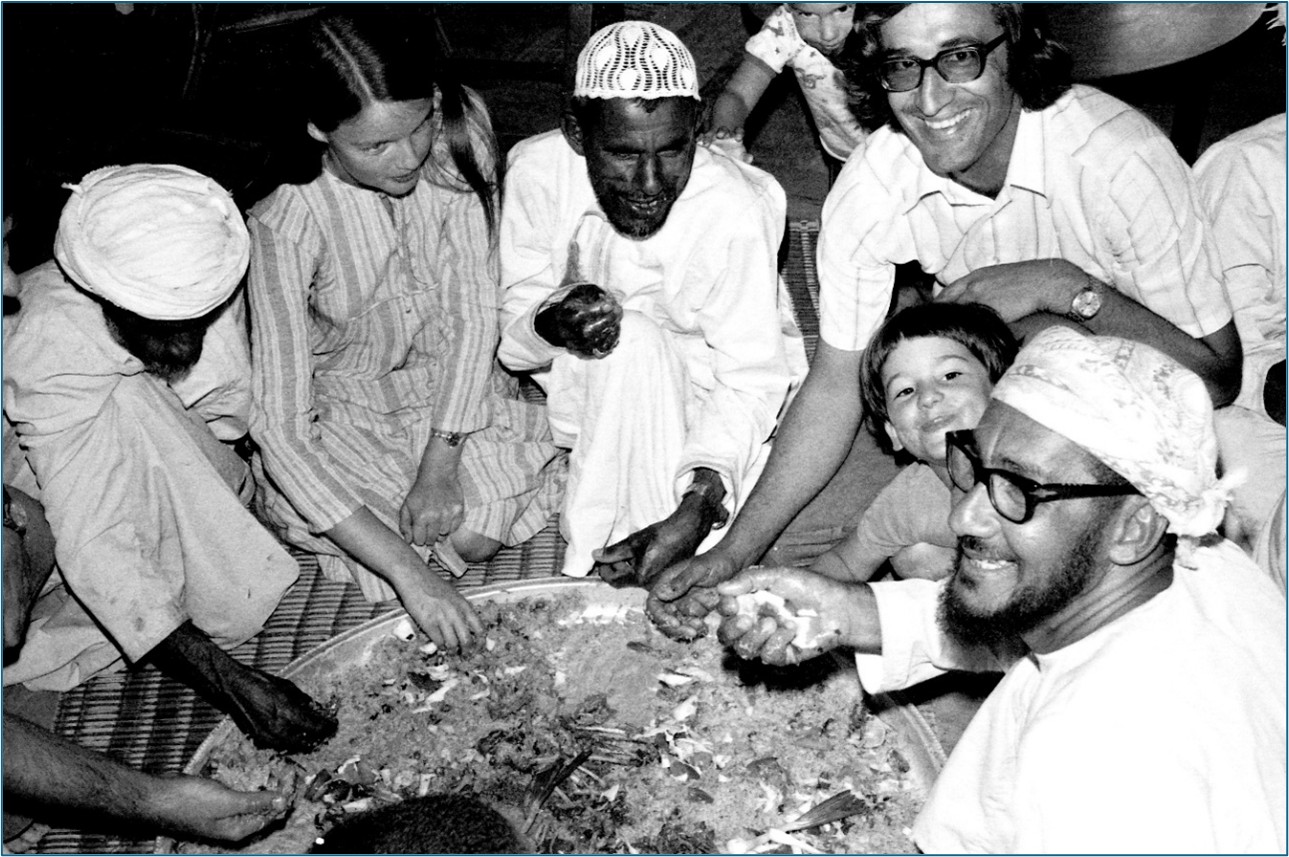
Celebratory meal for Roderic at Al Khaburah (1979), prior to his return to Durham University where he worked on the creation of CORD, but continued to visit and direct the Khabura project
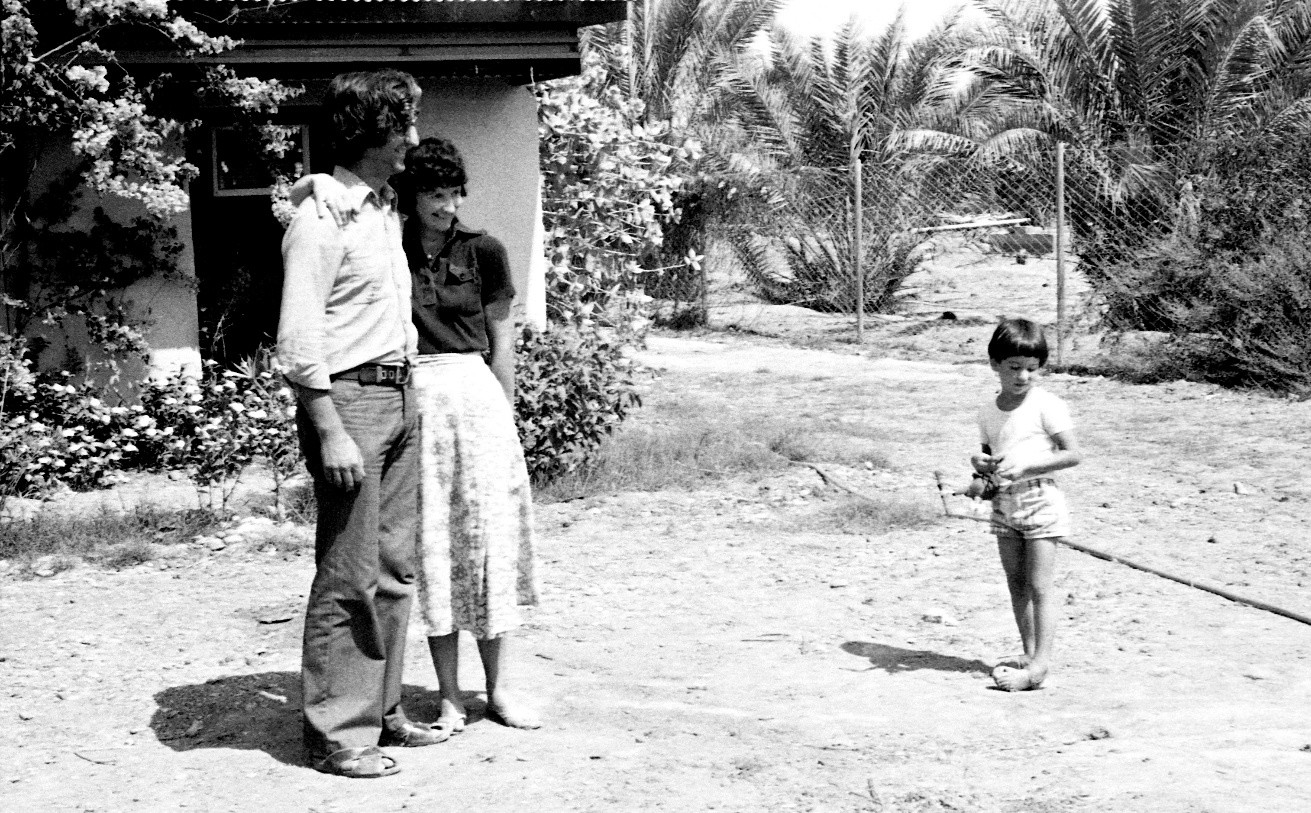
Roderic, Esther and son Jake outside their house at Al Khaburah (April 1979)
Those early days at Khabura defined Roderic’s future. His grasp of Arabic and ability to listen, were welcomed by the local community who were keen to understand the innovations being trialled, with farmers and craftsmen/women, adopting elements of the project’s activities. This “action research”, championed by Roderic, was a key principle in the establishment of the Centre for Overseas Research and Development (CORD) at Durham University in 1981, providing a base for practical and technical overseas field research, survey and development projects in the Middle East and Africa.
Wahiba Sands Project (1985-1987)
CORD played the role of scientific coordinator for the Royal Geographical Society (RGS) / Diwan of Royal Court multi-disciplinary Wahiba Sands Project (1985-87), with Roderic as Science Director. This was a pioneering geographical survey with some thirty members (field scientists and a logistics team) and Roderic’s applied approach was clear from the start. Any holistic geographical survey must bring together local and international experts in ‘earth, life and social sciences’ to work collaboratively ‘with and for’ all the appropriate government agencies.
The project had a central scientific aim, ‘a study of the early development of the Wahiba Sands (the Sharqiya Sands), its ecosystem and the impact of recent change’. The results were published in 1988, as a Special Report (No.3) of the Journal of Oman Studies. In the foreword, ‘Conservation: a shared responsibility’ HM Sultan Qaboos bin Said, wrote ‘The scientists are to be congratulated. They have made remarkable contributions to the advancement of knowledge about this hitherto unstudied area for the benefit of the world of science. Our students of Oman will also benefit. Many of them will be our decision-makers of tomorrow in matters concerning the development of our natural resource.’
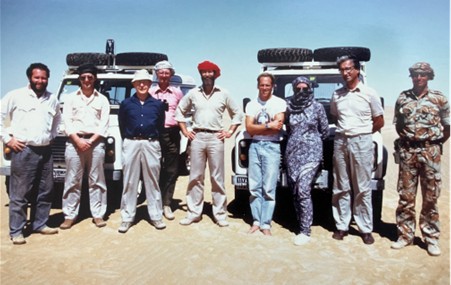
Wahiba Sands Project team members, including Nigel Winser (far left), with Roderic (2nd from right)
Jordan (1992 - 2002)
Roderic, based at CORD, was appointed as a Programme Director of the Jordan Badia Research and Development Programme. This complex multi-disciplinary project focused on the north-east Badia region of Jordan, home to a largely nomadic population attempting to adapt to challenges posed by climate change, regional upheavals, and rapidly increasing population, whom the Jordanian government was keen to assist. The academic results were published in 1998 in a landmark monograph “Arid Land Resources and their Management: Jordan’s Desert Margin” edited by Roderic together with Professor John Clarke and Anwar Battikhi. As Roderic wrote in the foreword “The aim of the research is to provide decision makers, in both the national government and local households, the information they require for sustainable management of Badia resources by government agencies and local people on behalf of the (local) population and the nation as a whole”.
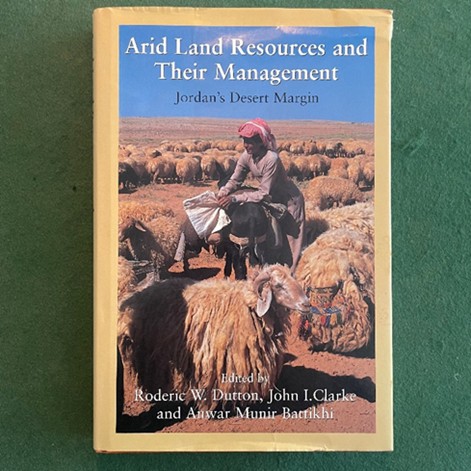
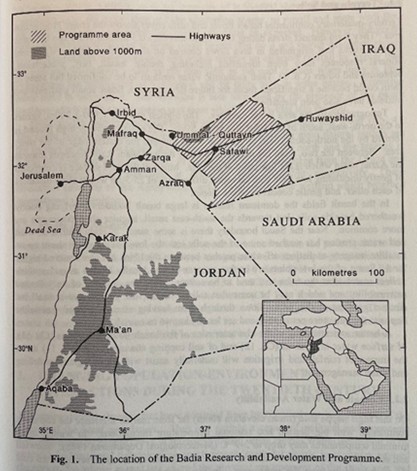
The study (1992-96) of Jordan’s Badia with Dr. Mohammed Shabaz at the Higher Council for Science and Technology was possibly the work of which Roderic was most proud. The results were published in a monograph by Kegan Paul International in 1998.
Yemen, Soqotra (1999 - 2009)
Roderic was introduced to Soqotra in 1999, when he worked as a livestock specialist for a WS Atkins International team on an EU-funded development plan for the island. He continued his association with the people of Soqotra, and its unique flora, in particular with a grant from the Darwin Initiative for an environmental education programme promoting biodiversity conservation. This resulted in the 2009 publication, with Sue Christie, of the textbook for schools “Soqotra, heritage and future”. Roderic had previously collaborated on publications, such as “Honeybees in Oman” and “Arab Village”, that were targeted at schools. These and the Soqotra activities highlighted Roderic’s recognition of the importance of engaging with younger generations, for sustainable development to be understood and adopted more widely in Middle Eastern societies - “there’s no long-term conservation if you don’t help children to commit to it”.
CORD closed in 2002 when Roderic, retired from full-time work at Durham University. Nevertheless, Roderic continued his work in Jordan and Soqotra for some years after this and he was appointed an Officer of the British Empire (OBE) in 2010 for his work in the Middle East.
The Oman Earthwatch Programme (2007-2013)
Earthwatch Europe took Roderic back to Oman in 2007. HM Sultan Qaboos, had asked Earthwatch to help develop the National Field Research Centre for Environmental Conservation, with the objective of finding and training a new generation of field researchers and initiating research projects that address conservation and development. Roderic worked with Dr. Saif Al Shaqsi at the new Centre, supporting five field programmes, in association with local communities, and laying foundations for wider field research by Omani scientists.
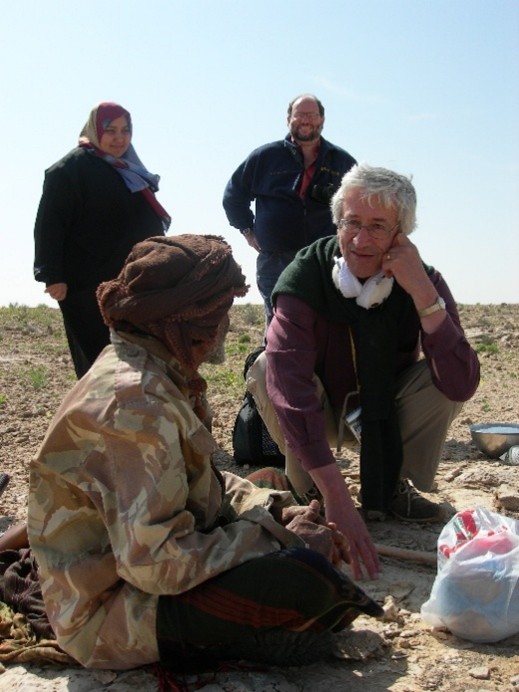
Roderic visiting Jabal Samhaan in 2009 and discussing the pros and cons of conserving the Nimr (Arabian Leopard) with Abu Hadi (Al Hikmani)
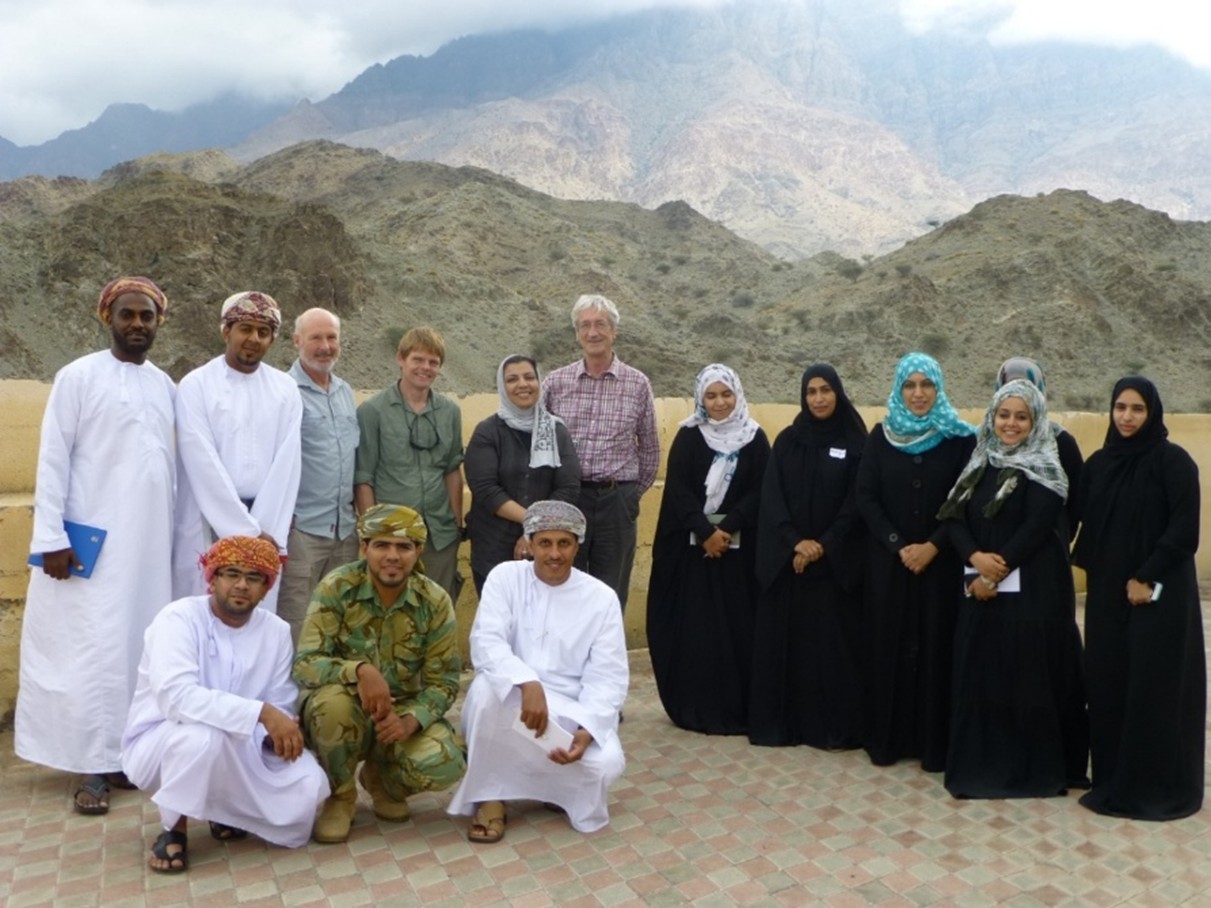
Roderic created inclusive teams focusing on real development issues at a local level.
Here (centre) with a team planning surveys of the Arabian Tahr led by Steve Ross (4th from left) in 2012.
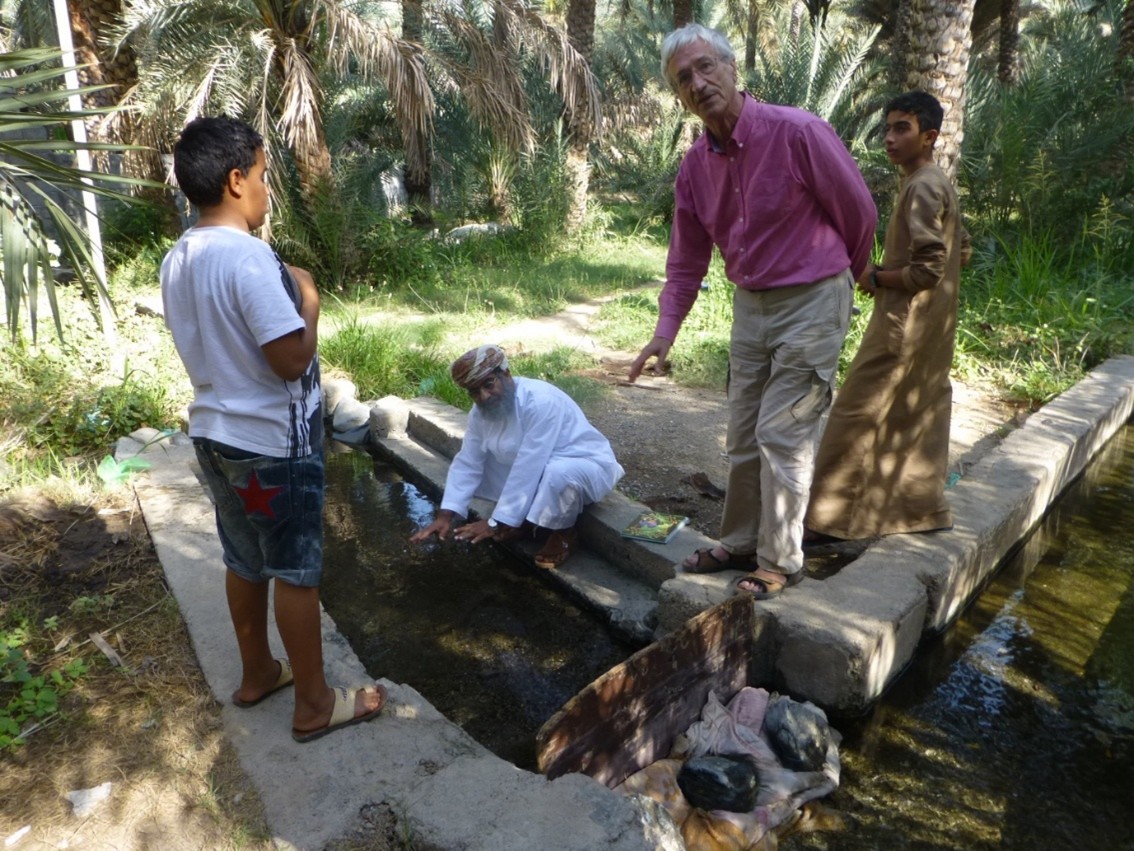
Roderic in 2013 as a part of the Earthwatch field programme and “action research” investigating the socio-economic and environmental sustainability of Oman’s Aflaj in the town of Luzugh
His links with Oman were maintained when, in 2014, he headed up a conference at the RGS entitled ‘Field Research in Oman, Past, Present and Future’, with 25 keynote talks by leading field scientists from Oman and UK, showcasing the variety of fieldwork undertaken across the country. The results were published in 2015 as one of the final reports emanating from the Oman Earthwatch Programme.
From 2016 to 2023 Roderic assisted the British-Omani Society with the annual Oman Natural Heritage Lectures at the Royal Geographical Society.
Roderic’s wide range of interests and affection for the people of Oman, Jordan and the wider region and desire to improve their livelihoods by means of ‘action research’, were the central themes of his working life and publications. He gave himself simply and unpretentiously to worthwhile experiences, finding fulfilment in encountering others with whom he could facilitate new projects.
Many thanks to Robert Whitcombe, Nigel Winser, Rebecca Ridley, Alan Roe, family and friends for their blog.